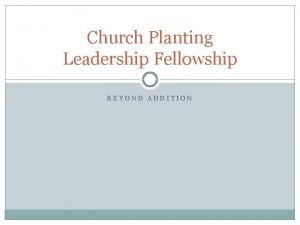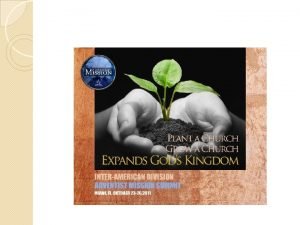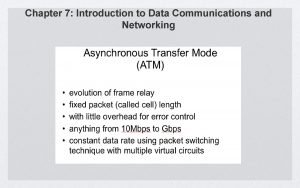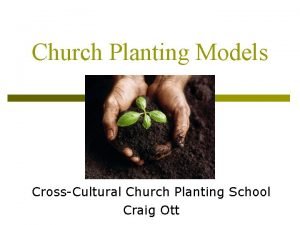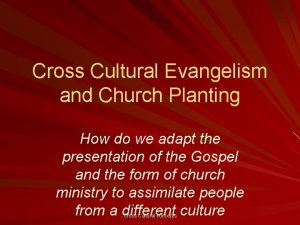Introduction to Cross Cultural Communications and Church Planting








- Slides: 8

Introduction to Cross Cultural Communications and Church Planting Why is it so difficult to communicate to people who are different from me?

The Task Never Changes Matthew 28: 19 -20 poreuo, contiguous aor. part. , “having gone”. Describes the only verb, “make disciples” with the objective: “to all nations”. Thus, “go…to all nations” is implied matheteuo, aor. imp. , “followers, Therefore go learners”. Acts 14: 21, “preach the and make disciples of all nations, gospel and making disciples” are baptizing them in the name linked. The task is to make followers of Christ. Time of verb of the Father means it is a singular task of the and of the Son Church. and of the Holy Spirit, 20 and teaching them to obey 21 everything I have commanded you. And surely I am with you always, to the very end of the age. " didaskontes, Baptizing, in Acts 2: 38 Peter understood a close association between believing and being baptized for a public profession panta ta e; qnh, “all the ethnic groups”. Est. 11, 000 people groups on earth. 6, 000 have heard or can hear, leaving 5, 000 to go. pres. act. part. , “instruct”. Associated closely with preaching Acts 4: 2.

Stages of Mission Task E-0 People within the church contacts E-1 People within the same culture and social level, but never been in the church E-2 People within a culture, with same language, but different cultural background from that of the church E-3 People within a different culture, a different language and greater distance from mother church.

Cross-Cultural Missions • To understand the Bible is “cross-cultural”— “cross-historical” – – – • Without clarification misunderstandings—Christmas. Santa and manger Techniques to learn languages and translate messages to another culture Understand the process of conversion and associated social changes How to make the gospel relevant to our listeners Skill of relating to culturally diverse people around the world The power of the gospel is to break down cultural prejudices while allowing differences to continue

Theological Assumptions 1. God’s Mission—It is HIS plan to reach out to the world, as we seek to fulfill HIS mission He provides and enables. 2. Authoritative Scripture—God’s self-revelation to mankind – – His Word needs to be communicated Given to humans in a specific historical and cultural context (we must relate to that culture 2000 years ago) 3. Christocentric—The perfect representation of God – – Like Him, we must seek to incarnate—to identify with those to whom we go The message is centered on Christ: sacrificial death and resurrection power and presence as the ONLY WAY for any man on earth to ever be accepted in heaven.

Theological Assumptions 4. Ministry of the Spirit – – He guides; burdens our heart, opens our eyes He convicts, draws, teaches, illuminates and opens their hearts 5. Kingdom of God—expansion of the church throughout the world – – How Christ relates and is glorified in different actions How Christ continues to “build” His church (Mat 16: 18) 6. Priesthood of all believers – God creates a “workmanship” in every believer (Ephesians 2: 10) to accomplish His eternal plan Talents Spiritual Gifts Personality Passion Experience God has uniquely equipped everyone to play a key part in world evangelism and church planting Deducting from what is known about our workmanship, a direction of purpose becomes clear

Biblical Principles • Philippians 2: 6 Who, being in very nature God, did not consider equality with God something to be grasped, 7 but made himself nothing, taking the very nature of a servant, being made in human likeness. • Matthew 16: 24 Then Jesus said to his disciples, "If anyone would come after me, he must deny himself and take up his cross and follow me.

Biblical Principles • 1 Corinthians 9: 22 To the weak I became weak, to win the weak. I have become all things to all men so that by all possible means I might save some. 23 I do all this for the sake of the gospel, that I may share in its blessings.




